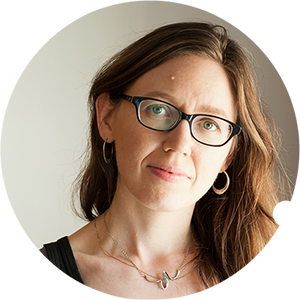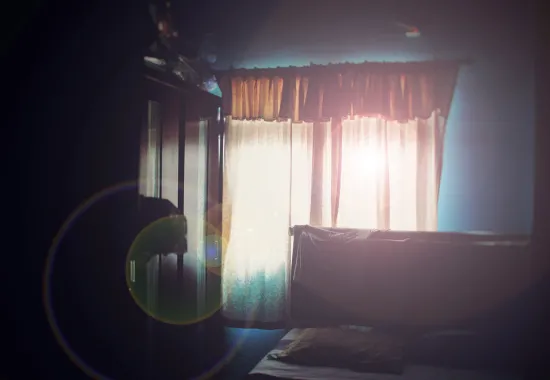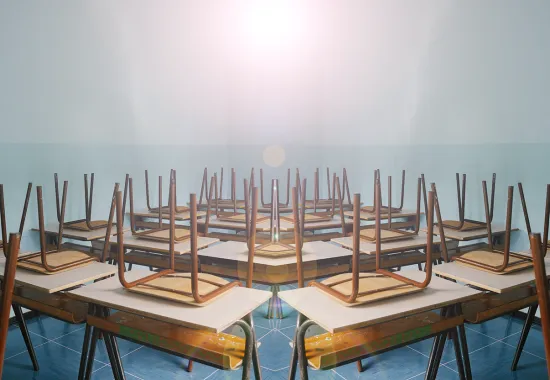Bloodletting
I started shitting blood when I was 12. It began slowly, just a few red watercolor drops in the toilet water. Soon it was a flood. But I’ll get to that in a second. First I want to talk about fantasies.
Before I was sick, I was alone. There were small alones in Alaska, where I am from. Dad at work, or at the lake, or away on a trip. Sometimes hunting. Sometimes fucking our neighbor, the one with the drunk husband. Mom in her pottery studio. She would take her pots straight from the kiln, find them inadequate, and smash them against the wall. Months of work broken into sharp rage. Swept into the corner and hated. She did not like the things she made. Where was I? On a calm day, alone in my room, drawing. On argument days, in my closet, hiding. On fighting days, in the slot between my bed and the wall, hiding better.
The small truth was that dad was not interested in a little girl and mom did not want distractions in her studio. I would learn the big truth later, when dad told me I shouldn’t support abortion rights because I was supposed to have been an abortion. That was after we moved to Washington state and Mom came out of the closet and Dad tried to strangle her and she left. The big alone started then, in my new town of loggers and meth near the Canadian border. Dad’s stuff was there. But he was elsewhere. Sometimes in Seattle. Sometimes with a girlfriend. Sometimes I would hear him come in late. But he’d be gone again in the morning.
His stuff included guns, which I considered using to blow my brains out, and an endless supply of NyQuil, which Dad kept around for his sinus problems. I was too pussy for the first option. So I took the second, every night, after I finished my homework. I looked forward to that double dose and the soft push into nonexistence. Where I belonged.
Here’s what I have learned: your fantasies can sustain you. Your fantasies can destroy you.
I am eleven years old in a big house on the side of a mountain. The sky is starless. Fog is rolling in. I switch on the TV for company. Though the volume is high, I hear a coyote outside. Its song is raw and hungry and it creates a sympathetic vibration that shatters my body into a thousand pieces. I am remade as a watchful animal.
Aloneness. Not solitude, which sounds like relief. Not isolation, an institutional verdict. Not home alone, which comes with comedy and a happy ending. Abandonment? Ok, sure. But aloneness is the state. Nothing else sounds precise enough to describe a competent child who makes breakfast gets ready gets to school gets good grades buys lunch gets home does homework does chores microwaves a frozen dinner reads writes in a journal and hides the fact that she is alone. It’s nothing to cry about. Other little animals have it worse. A half-mile down the mountain Felicia is alone, and she doesn’t have electricity.
To fill the emptiness, I fantasized that I’d come from a palace of an Alaskan home and now lived in rarified luxury. I told my classmates that my mother was a famous artist traveling the country and that’s why she wasn’t around. My father and I were planning trips around the world. I wrote these stories down in journals and lied like it was nothing. I thought them up and wrapped them around me like a parent’s embrace. Without them I would have been nothing but lonely and scared. They saved me from that. In fact, my fantasies sank so deep into my bones that when I returned to my hometown with my husband a few years ago and saw that my palace was really a little house on the edge of the trailer park, my brain couldn’t register what my eyes beheld and for a few seconds I saw nothing at all. And that upscale restaurant I told my husband about, that I was so excited to take him to? It’s a single-tap bar in the middle of nowhere with an open fire pit and a hole in the ceiling. How funny, I said, I remember it differently. Detached comments to hide my shock.
Here’s what I have learned: your fantasies can sustain you. Your fantasies can destroy you. And so can the fantasies of other people. Don’t believe they can be that powerful? Think of all the wars that have ever been fought because some folks say heaven is one thing and other folks disagree. Then hear me when I say fantasies can be strong as a motherfucker.
My next fantasy was. I’d convinced myself that even though I was shitting blood, I was a normal, healthy teenager. I was losing weight but said my family ran thin. I was fainting at school but said I was just tired. And then, when I could no longer deny that I was sick, that I needed help, it was too late. I had a disease no one believed I had. Fourteen years old, newly in high school, the blood getting worse. I could time it. If I shat blood first thing in the morning, I could go all day at school before I had to do it again. Once at 6 a.m. and again at 3 p.m., after school got out.
I told Dad; he said it was growing pains. Mom returned to the area; I told her, and she took me to a general practitioner, who likewise said it was growing pains. When I returned to that doctor some time later with the same symptoms, she gave me a tube of Neosporin to put on my asshole. I did not bother telling Mom’s girlfriend. She was occupied by the cerebral palsy of her own daughter.
My protests were nothing against this fantasy that I was fine, this fantasy I had conjured myself only to have it reflected back to me after I realized my mistake. You’re shitting blood, you say? That’s gross. Don’t be gross. In time my body seemed to flush its entirety each day, a sensation like constant diarrhea, with cramps that came fast and sharp and unannounced. The pain as disorienting as a punch to the face. It registered only after a delay. The brain must catch up to the body.
Don’t leave the circle. Tell stories to keep everyone out. Let no one in.
Now. In the grand scheme of things, a fucked-up lonely sick childhood, who cares? It doesn’t matter. But here’s what does: shit. To deny it is to deny humanity, real humanity, not the ultra-sanitized neat-and-tidy American version that is the biggest fantasy of them all. To deny it is to deny reality. Think of all the shit that’s around you, right now. In pipes underfoot, in airplanes overhead. Think of all the shit that’s inside you, right now. But there’s a straight line from politics to the body, so there’s a straight line from the America that says we should work nonstop and the idea that the body is anything other than a slimy unruly mess of shit, blood, guts, fibers, bone, mucosa, ligaments. You want a sick day, worker? Lazy. You say you’re shitting blood, little girl? Liar. It all amounts to our nation’s biggest con. The shame of shit? The refusal to provide for illness and breakability? Denial of humanity. The promotion of a “perfect” body and its Instagram portrayal? Denial of humanity. Why does America want to deny humanity so bad? It’s like everyone’s thinking way in the back of the mind that if we’re not really human we won’t have to die. Well, buddy, I have some news for you.
How nice if my fantasy had kept me safe, like the earlier ones had. But fantasies are like parents, not only because they can save or destroy you, but because you don’t always know which kind you’ve got until it’s too late.
•
When I began passing out at school I was five foot eight and weighed less than a hundred pounds. A guidance counselor asked if I had an eating disorder. He did not believe me when I said no.
Some months later, the general practitioner sent me to a local gastroenterologist who performed colonoscopies every week but couldn’t say what was wrong. He told me to toughen up when I wept from the pain. It looked like ulcerative colitis. But I was too young. It couldn’t be, because he personally had never seen someone so young with that disease—imagine the fantasy he held of himself. He sent me to the hospital, where they dosed me with painkillers and put me on a saline drip. A GP there suggested I watch only comedies on TV, because laughter is the best medicine. That man is no longer in practice.
A month passed. I got worse.
And finally, when everyone got tired of watching me “circle the drain,” as I overheard one nurse say, they called a specialist in Seattle. I was sent in an ambulance to his office, and within an hour of that appointment came an emergency surgery to cut out my entire large intestine, which the specialist later said looked like several feet of ground meat. That’s what can happen if you leave ulcerative colitis untreated. You get “toxic megacolon” and rot to death from the inside. If you treat it early, the same surgeon said, it’s not that big of a deal.
•
Awake. A slow rise to the surface from underwater. The brightness of the ICU is like looking directly at the sun. I lift the blanket, pull up my hospital gown. A row of metal staples along an angry red slash from pubes to sternum. Or, rather, where pubes should be. They’ve shaved me; I’m a little girl again. There are two tubes stuck into my flesh below each hip bone which syphon watery blood into bulbs the size of a fist. And on the right, a half inch of small intestine protruding from my abdominal wall. It is covered by a see-through colostomy bag and it pulses now and then with its own life. It excretes thick greenish liquid, shit before it’s shit, and produces a strange sensation like a muscle stretching where no muscle should be.
Here is the smell of stomach acid, sweet and rotten. Here is the interior, exposed. Here is blood and shit and mucous, deposited into a bag worn at the waist. Here are the two halves of the body, precariously held together by thirty-two staples. My skin strains at the edges of the metal spikes like it wants to burst. The mind’s-eye image of my body split apart, seen from above, an animal dissected by students. The gleam of instruments and hum of electronic machines. Violence on an already broken body.
•
I am fifteen. Back at school, making up new stories and wearing baggy clothes to hide my colostomy bag. It was nothing. I’m fine! Here is the fear of humiliation that someone will know I wear the ultimate gross-out joke. So: I can’t come to the sleepover, I prefer to sleep at home. I can’t go on the camping trip, I don’t like to camp. I can’t go swimming in the lake, I’m not a fan of swimming. Hiding, hiding, hiding inside a fantasy. I’m good at it.
Here’s how to hide: draw a circle around everything you want, everywhere you want to go. Now bring it in slowly. When it’s just around your body, you’re safe. Don’t leave the circle. Tell stories to keep everyone out. Let no one in. When the big house on the mountain was too scary, when the emptiness felt like a horror movie, I would take a blanket into the upstairs bathroom and sleep with my back to the door. Like the space between the bed and the wall, it was the smallest and safest place.
•
I’m sixteen. I have two more surgeries to connect my small intestine to what’s left of my rectum and asshole so I can shit like everyone else. Don’t worry, the surgeon says, you’ll still be able to have children, as if I would wish life on anyone.
•
Would you like to learn more about hiding? The rules are changing; now you carry a hiding place inside yourself. Go to college and pretend you are someone else. Tell no one about your routine doctor appointments or the fact that you calculate your distance from the bathroom everywhere you go. It’s true you no longer have a colostomy bag. It’s true that gastrointestinal doctors sometimes refer to the colon as a “convenience organ,” meaning, it’s unnecessary to sustain life. But without one food passes through your body at lightning speed, which also means you will never again sleep through the night. Next, move as far away as you can get, which is New York. Work as a reporter. Write about other people and never use the singular first person. Save some money and spend it on a one-way ticket to a place no one will ever find you: Cambodia. Write about little girls getting fucked and women getting fucked and hate the other Americans with their money and their health and their parents who visit and their predictable Graham Greene fantasies. Return to New York and keep hiding. Write about Wall Street. Hide. Wish with all your heart you could step outside the circle. Risk it and go back to school.
•
I am sitting across from my professor, whom I love. To me she is like Jesus Christ. In her class, everyone is worthy of salvation. The market has just crashed. America has messed up big and the whole world is broke.
We are at a café by school. I order what she orders because I want what she wants. My professor talks with a stutter. I love her so much that sometimes I practice stuttering too, alone, just to live inside her mouth for a little while.
She says: I like stories that take place on the body. That’s why I usually assign Justine, but I’m taking a break from it this year.
I read Justine over the summer because I looked up her favorite books and read them all.
She says: I think you should write more about your disease.
She says: I’ll help you.
Yes, I say, that would be great.
Wait, stop. This started out true but now it is just another fantasy. I cannot say any of this to my professor because we are in New York, rarified New York, where someone like me has no business living because I have no business living anywhere or at all. I am not supposed to be here, not like this glittering soulfired woman who writes like a truth scream. I am not even a real person.
We are at the café. I want to live in her mouth. She asks me what I want to drink and I say I don’t know. She asks me what I want to write. I say I don’t know.
•
Return to safety. Write about anything other than yourself. Hide. Write some fiction, make it up, you’re good at invention. Interview writers and wish you were like them. Hide. Follow your husband to Scotland; he is a real artist and performs before audiences. But you? Keep hiding. Again imagine pushing your wet animal nose into the open. Imagine it smelling of garbage and grass. Of food and shit and perfume. Close your eyes and picture yourself there. Wonder what kind of fantasy this is, the good kind or the bad. Wonder if it is safe.
“Bloodletting” first appeared in the Fall 2019 issue of the North American Review. You can purchase a copy here.
Recommended
Crossing Paths
I Have Only Dreamed You Dead, For Now.
Encounter






